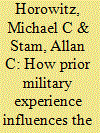| Srl | Item |
| 1 |
ID:
158846


|
|
|
|
|
| Summary/Abstract |
Does trade reduce conflict even when states compete over high-salience issues (e.g., territory)? Despite recent challenges to liberal peace theory, few studies have examined whether the trade-reduces-conflict argument is robust to particularly conflict prone issues like territory. We evaluate whether trade reduces not only violent conflict over territory, but also the incentives to use specific power politics behaviors (e.g., arms races) associated both with territorial competition and a higher probability of war. As key causal mechanisms, we rely on opportunity costs and the ability to credibly signal information that increased trade generates, reducing states’ incentives to engage in violent conflict and arms races. Empirical analyses, using multiple sample populations and different measures of key indicators and outcomes, are consistent with our expectations. The results suggest that trade may reduce conflict both directly, by decreasing the likelihood of militarized disputes, and indirectly, by reducing the likelihood of power politics strategies like arms races, thought to increase the likelihood of war.
|
|
|
|
|
|
|
|
|
|
|
|
|
|
|
|
| 2 |
ID:
133273


|
|
|
|
|
| Publication |
2014.
|
| Summary/Abstract |
Policy-makers and the electorate assume political executives' life experiences affect their policy choices once in office. Recent international relations work on leaders focuses almost entirely on how political institutions shape leaders' choices rather than on leaders' personal attributes and how they influence policy choices. This article focuses the analytic lens on leaders and their personal backgrounds. We theorize that the prior military background of a leader is an important life experience with direct relevance for how leaders evaluate the utility of using military force. We test several propositions employing a new data set, building on Archigos, that encompasses the life background characteristics of more than 2,500 heads of state from 1875 to 2004. The results show that the leaders most likely to initiate militarized disputes and wars are those with prior military service but no combat experience, as well as former rebels.
|
|
|
|
|
|
|
|
|
|
|
|
|
|
|
|